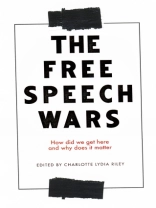Who gets to exercise free speech, and what happens when powerful voices think they have been silenced? Assembling a diverse group of commentators, activists and academics, this book explores the contemporary free speech wars to try to understand how this issue has become increasingly charged. It asks how the spaces and structures of ‘speech’ – mass media, the lecture theatre, the public event, the political rally and the internet – shape this debate. The contributors examine how acts such as censorship, boycotts, and protests around free speech developed historically and how these histories inform the present. The book explores the opposing sides in this debate: beginning with a defence of speech freedoms and examining how speech has been curbed and controlled, before countering this with an exploration of the way that free speech has been weaponised and deployed as a bad faith argument by people wishing to commit harm. Considering two key battlefields in the free speech wars – the university campus and the internet – this book encourages the reader to be suspicious of the way that this topic is framed in the media today.
The free speech wars offers context, provocation, stimulation and – hopefully – a route through this conflict.
Table des matières
Introduction – Charlotte Lydia Riley
Protecting freedom of speech
1 Protecting the freedom of speech – Jodie Ginsberg
2 Open air free speech: the past, present, and future of Speakers’ Corner – Edward Packard
3 The problem of neutrality and intellectual freedom: the case of libraries – Sam Popowich
4 In a diverse society, is freedom of speech realisable? – Emma Harvey, co-written and edited by Edson Burton
5 Training readers as censors in Nazi Germany – Victoria Stiles
6 Is boycotting for or against free speech? – Andrew Phemister
Free speech as a weapon
7 Why (and how) anti-racists should defend free speech (and why they shouldn’t describe their opponents as free speech defenders) – Omar Khan
8 Drinking the hemlock: Socrates and free speech – Neville Morley
9 Secularism, Islamophobia and free speech in France – Imen Neffati
10 The logic of nonsense – Nina Lyon
11 Weaponised Swissness – Janna Kraus
12 Free speech and the British press – Aaron Ackerley
Free speech on campus
13 Free speech and preventing radicalisation in higher education – Shaun Mc Daid and Catherine Mc Glynn
14 Anatomy of a ‘trigger warning’ scandal – Gabriel Moshenska
15 Grad school as conversion therapy: ‘free speech’ and the rights of trans and non binary people on university campuses – Grace Lavery
16 Teaching ‘Freedom of Speech’ freely – Paul Whickman
17 The politicisation of campus free speech in Portugal – Adam Standring, Daniel Cardoso and António Dias
18 Free speech on campus – Marta Santivanez
The internet: The Wild West of free speech
19 A post-modern neo-Marxist’s guide to free speech – Ben Whitham
20 Free speech and online masculinity movements – Henry S. Price
21 Choose your fighter: loyalty and fandom in the free speech culture wars – Penny Andrews
22 Free speech in the online ‘marketplace of ideas’ – Helen Pallett
A propos de l’auteur
Charlotte Lydia Riley is a Lecturer in twentieth-century British history at the University of Southampton












